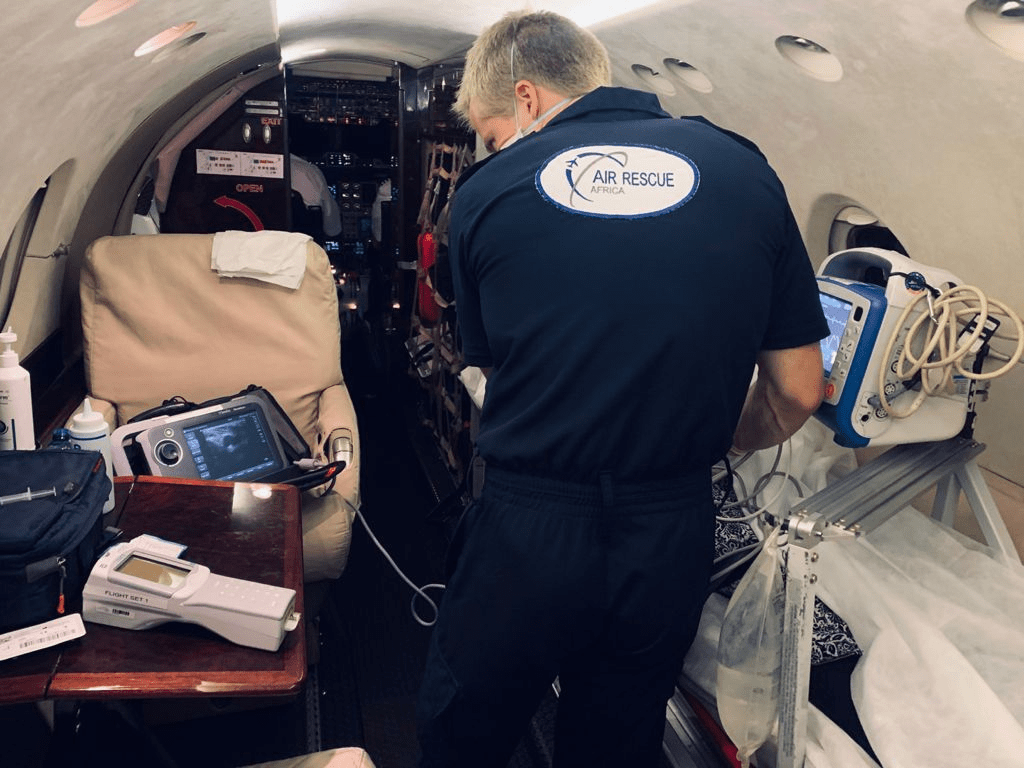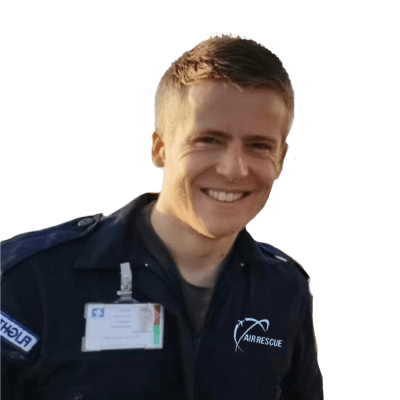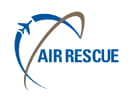Reflection on the Use of Point of Care Ultrasound During Critical Care Retrievals
12.05.2023 | Johannesburg, South Africa
Point Of Care Ultrasound (POCUS) has become synonymous with emergency medicine, critical care, and retrieval medicine. With the advancement in the technology of handheld devices, their widespread availability and better affordability, the use of POCUS has expanded significantly in recent years. We have been making use of point of care ultrasound on our air ambulance in Africa since 2010 and tracking the development and utilisation thereof over the years have been truly remarkable.
With the mainstay of our service offering being long haul international retrievals with patients often located in resource limited settings, POCUS has become invaluable in making critical diagnoses and safely performing a multitude of procedures.

Dr Ulrich using Ultrasound device during an Air Ambulance Flight of Air Rescue Group
To ensure proficiency in POCUS all our flight doctors go through a rigorous training program culminating in an external accreditation process by a national emergency medicine society. We also host regular training days where procedural skills are practiced and the latest developments in the field are discussed and put into practice. In addition, we make use of a device boasting some of the latest ultrasound technology and software, the Butterfly IQ+.
The value added by point of care ultrasound to the clinical practice of our medical crew is doubtless. Over the past few years, we have evolved to the point where having to do a case without having point of care ultrasound available is almost unthinkable. To illustrate this, the following examples reflecting recent practice are mentioned.
- Regional anaesthesia: Several different ultrasound guided nerve blocks are performed on a regular basis to form part of a multimodal approach to pain management. Plexus blocks involving the upper and lower limbs, as well as the trunk are frequently being offered to suitable patients resulting in a substantial decrease in pain during transfers.
- Vascular access: In line with globally accepted best practice standards, all central venous catheters as well as arterial cannulas are done with real time ultrasound guidance. In addition, obtaining peripheral intravenous access with ultrasound guidance in patients where conventional insertion techniques have failed, has negated the need for central- or intraosseous access on numerous occasions.
- During the past year critical diagnoses have been made by means of ultrasound including pneumothoraxes (on multiple occasions), deep vein thrombosis (both in the IVC and the lower limbs), pericardial effusions, etc.
- Assistance with clinical decision making specifically relating to source of shock, fluid status, cardiac function, etc. POCUS findings often serve as an important datapoint when it comes to the management of critically ill patients in challenging and resource limited environments.
- More nuanced applications of POCUS have recently been included in the training program of flight crew including:
- Airway ultrasound to confirm correct endotracheal tube placement, appropriate endocranial tube depth and to identify landmarks for an emergency surgical airway.
- Screening patients with intracranial pathology for possible raised intracranial pressure.
- Use of ultrasound to assess for reversible causes during cardiac arrest.
- Ultrasound guided pericardiocentesis for patients with sonographically identified pericardial tamponade.
As a patient-centred quality assurance measure, all ultrasound findings obtained during a case get reviewed and audited retrospectively by a member of the medical leadership. Patient safety is further ensured by use of checklists for certain procedures, for example ultrasound guided regional anaesthesia.
Looking to the future is also exciting. With the technology already available an initiative is now being implemented on our service where off-site assistance can be provided by means of teleguidance. With the rapid development of point of care ultrasound one can expect significant further expansion of its use and this should be a skill central to the armamentarium of the accomplished retrieval practitioner.
Dr. Ulrich Carshagen
Lead Flight Physician at Air Rescue Group



